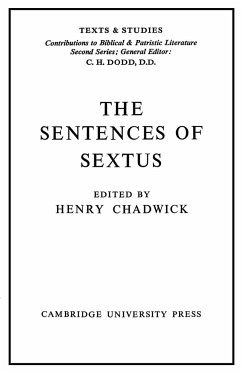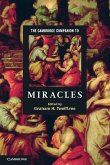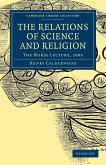A collection of ethical aphorisms for centuries by Christians from Britain to Mesopotamia.
Sextus's Sentences are a collection of ethical aphorisms which for centuries were read in Latin, Greek, Syriac and Armenian, by Christians from Britain to Mesopotamia. Who 'Sextus' was, and whether he was a Christian, is not certain; Dr Chadwick discusses the evidence, including some he has discovered himself. But the Sentences, probably written in the second century, were widely read in Jerome's time, and were still treated as authoritative in the Middle Ages. They are an important strand in the history of the development of Christian ethics, and are yet another example of that dialogue between the Greek and the Jewish which so profoundly affected the development of the young religion. Dr Chadwick first provides a critical edition of the Greek and Latin texts. There follow studies of the moral teaching of Sextus, the evidence of Origen, the testimony of Rufinus and Jerome, and the internal evidence provided by the texts.
Table of content:
Note on Sigla Employed; Preface; Part I. Texts: 1. The manuscript tradition and the versions of Sextus; 2. The Greek text of Sextus and Rufinus' translation; 3. The Greek appendices to Sextus; 4. Clitarchus; 5. The Pythagorean sentences; Part II. Studies: 6. The moral teaching of Sextus; 7. The evidence of Origen; 8. Rufinus and Jerome; 9. Internal evidence; 10. Notes on Sextus 1-451; Bibliography; Index of Greek words in Sextus; Index of names and subjects.
Hinweis: Dieser Artikel kann nur an eine deutsche Lieferadresse ausgeliefert werden.
Sextus's Sentences are a collection of ethical aphorisms which for centuries were read in Latin, Greek, Syriac and Armenian, by Christians from Britain to Mesopotamia. Who 'Sextus' was, and whether he was a Christian, is not certain; Dr Chadwick discusses the evidence, including some he has discovered himself. But the Sentences, probably written in the second century, were widely read in Jerome's time, and were still treated as authoritative in the Middle Ages. They are an important strand in the history of the development of Christian ethics, and are yet another example of that dialogue between the Greek and the Jewish which so profoundly affected the development of the young religion. Dr Chadwick first provides a critical edition of the Greek and Latin texts. There follow studies of the moral teaching of Sextus, the evidence of Origen, the testimony of Rufinus and Jerome, and the internal evidence provided by the texts.
Table of content:
Note on Sigla Employed; Preface; Part I. Texts: 1. The manuscript tradition and the versions of Sextus; 2. The Greek text of Sextus and Rufinus' translation; 3. The Greek appendices to Sextus; 4. Clitarchus; 5. The Pythagorean sentences; Part II. Studies: 6. The moral teaching of Sextus; 7. The evidence of Origen; 8. Rufinus and Jerome; 9. Internal evidence; 10. Notes on Sextus 1-451; Bibliography; Index of Greek words in Sextus; Index of names and subjects.
Hinweis: Dieser Artikel kann nur an eine deutsche Lieferadresse ausgeliefert werden.


![Some of the Writings and Last Sentences of Adolphus Dewey [microform]: Executed at Montreal, Aug. 30th, 1833 Some of the Writings and Last Sentences of Adolphus Dewey [microform]: Executed at Montreal, Aug. 30th, 1833](https://bilder.buecher.de/produkte/65/65542/65542937m.jpg)





